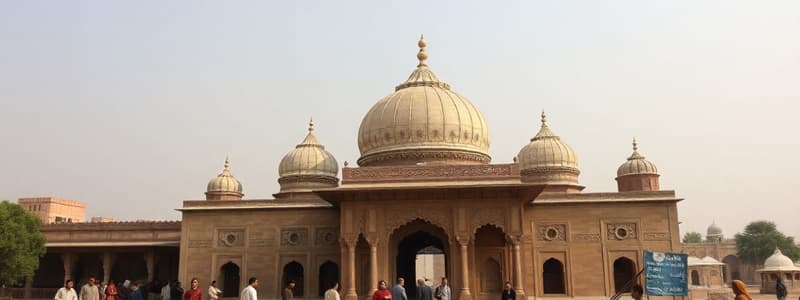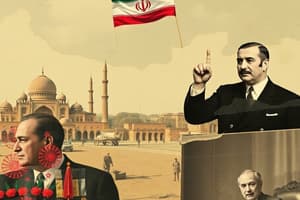Podcast
Questions and Answers
Who led the first series of Turkish invasions into India?
Who led the first series of Turkish invasions into India?
- Muhammad-bin-Qasim
- An unknown invader
- Mahmud of Ghazni (correct)
- The Umayyid Dynasty
The Arab invasion of India began in the 8th century CE.
The Arab invasion of India began in the 8th century CE.
True (A)
What was the primary reason for the Arab presence on the Malabar Coast?
What was the primary reason for the Arab presence on the Malabar Coast?
Trade and religious activities
The Arab control over Sind and Multan lasted for approximately _____ years.
The Arab control over Sind and Multan lasted for approximately _____ years.
Match the following terms with their definitions:
Match the following terms with their definitions:
What motivated Muhammad Ghori to invade India?
What motivated Muhammad Ghori to invade India?
Prithviraj Chauhan defeated Muhammad Ghori decisively in the First Battle of Tarain.
Prithviraj Chauhan defeated Muhammad Ghori decisively in the First Battle of Tarain.
Who was Prithviraj Chauhan's secret supporter?
Who was Prithviraj Chauhan's secret supporter?
Muhammad Ghori was defeated in the First Battle of Tarain in the year ____.
Muhammad Ghori was defeated in the First Battle of Tarain in the year ____.
Match the following events with their corresponding descriptions:
Match the following events with their corresponding descriptions:
What year did Muhammad Ghori defeat Prithviraj Chauhan?
What year did Muhammad Ghori defeat Prithviraj Chauhan?
The establishment of the Delhi Sultanate occurred in 1206.
The establishment of the Delhi Sultanate occurred in 1206.
Who plundered the Somnath Temple in 1026?
Who plundered the Somnath Temple in 1026?
The lack of progress in military tactics made Indian armies vulnerable to Turkish _______.
The lack of progress in military tactics made Indian armies vulnerable to Turkish _______.
Match the following figures with their actions:
Match the following figures with their actions:
What motivated Mahmud of Ghazni to launch raids into India?
What motivated Mahmud of Ghazni to launch raids into India?
Mahmud of Ghazni only targeted military fortresses during his raids.
Mahmud of Ghazni only targeted military fortresses during his raids.
Which famous temple was attacked by Mahmud of Ghazni in 1026?
Which famous temple was attacked by Mahmud of Ghazni in 1026?
Al-Biruni wrote a significant work called __________.
Al-Biruni wrote a significant work called __________.
Who wrote Shah Namah and was commissioned by Mahmud?
Who wrote Shah Namah and was commissioned by Mahmud?
Match the following events with their descriptions:
Match the following events with their descriptions:
Mahmud of Ghazni's raids had no long-term impact on the region.
Mahmud of Ghazni's raids had no long-term impact on the region.
What happened to the Ghazanavid Empire after Mahmud's death?
What happened to the Ghazanavid Empire after Mahmud's death?
Study Notes
Arab and Turkish Influences
- Arabs settled in India from the 7th century, primarily along the Malabar Coast.
- They introduced cultural exchange with their faith and mosques.
- Muhammad-bin-Qasim, a general of the Umayyad Dynasty, conquered Sind in 712 and Multan in 713.
- These territories remained under Arab control for nearly 150 years.
- Turkish invaders began entering India through mountain passes in the northwest from around 1000.
Mahmud of Ghazni
- Mahmud of Ghazni, a ruler of Ghazni (modern Afghanistan), launched numerous raids into India between 1000 and 1026.
- He primarily targeted wealthy temple towns for their treasures, including the Somnath Temple in 1026.
- His raids were violent and caused significant damage and deaths.
- Mahmud was also a patron of the arts and sciences, supporting scholars like Al-Biruni (author of Kitab-ul-Hind) and poets like Firdausi (famous for Shah Namah).
Muhammad Ghori
- Mu'izz ud-din Muhammad Ghori, a ruler who capitalized on the weakening Ghazanavid Empire, expanded his kingdom, incorporating Ghaznavid territories.
- Ghori's primary goal was to create a vast empire.
- He conquered Punjab in 1190, setting the stage for his confrontation with Prithviraj Chauhan.
The Battles of Tarain
- The First Battle of Tarain (1191) resulted in a decisive defeat for Ghori, but Prithviraj Chauhan did not press his advantage.
- The Second Battle of Tarain (1192) saw Ghori defeat Prithviraj, ultimately leading to the establishment of the Delhi Sultanate.
Factors Contributing to Turkish Success
- Political disunity in India, with numerous kingdoms constantly at war, prevented a united defense against the invaders.
- India's military backwardness – slow-moving elephants and swordsmen were no match for the Turkish horses and archers.
Impact of the Turkish Invasion
- Political: The establishment of the Delhi Sultanate, controlling large parts of Northern India.
- Military: The development of new trading centers like Lahore and Multan.
- Cultural: A composite culture emerged through the interaction between Turks and Indians, reflected in art, architecture, food, language, and music.
Studying That Suits You
Use AI to generate personalized quizzes and flashcards to suit your learning preferences.
Description
Explore the impacts of Arab and Turkish settlers in India from the 7th century onward. Learn about significant figures such as Muhammad-bin-Qasim and Mahmud of Ghazni, their conquests, and cultural contributions. This quiz covers the dynamics of these historical influences and their lasting effects on Indian society.




